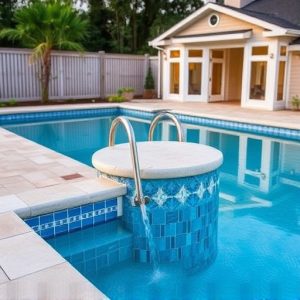Swimming Pool Alarms for Inground Pools: Comprehensive Guide
“Swimming pool alarms for inground pools are essential safety features that can protect against acci…….
“Swimming pool alarms for inground pools are essential safety features that can protect against accidental drownings and unauthorized access. This comprehensive guide, ‘Understanding Inground Pool Alarms: A Comprehensive Overview,’ delves into the benefits of installing these life-saving devices. We explore various types suitable for inground pools, provide tips on choosing the right system, and offer installation, maintenance, and safety guidelines to ensure your pool is protected.”
Understanding Inground Pool Alarms: A Comprehensive Overview
Inground pool alarms are an essential safety feature designed to protect swimmers and provide peace of mind for pool owners. These advanced systems are specifically tailored to monitor and detect any unusual activity or potential hazards within the deep waters of inground pools. Unlike surface-level alarms, which often prove unreliable in such environments, these alarms offer a comprehensive solution by utilizing sophisticated sensors and technology to ensure maximum protection.
Swimming pool alarms for inground pools come in various types, each offering unique advantages. From motion detectors that trigger alerts upon sensing movement across the pool’s surface to advanced submerge sensors capable of detecting changes in water levels or unusual currents, these alarms provide a multi-layered approach to safety. They are equipped with features like remote monitoring, automatic shutdowns for pumps and filters, and customizable alert systems, ensuring swift responses to potential risks, such as accidental falls or drowning attempts.
Benefits of Installing Swimming Pool Alarms
Swimming pool alarms for inground pools offer a multitude of benefits, enhancing both safety and peace of mind for homeowners. These devices are designed to detect unauthorized access or unexpected activity around the pool, providing an immediate alert to potential dangers. By installing swimming pool alarms, you create a secure environment, especially when children or unsupervised visitors are present. The alarms serve as a powerful deterrent against accidental drowning and ensure quick response times in case of emergencies.
Moreover, inground pool alarms provide year-round protection, offering parents and pool owners constant reassurance. They can be tailored to various pool settings, from residential backyards to commercial facilities, ensuring compliance with safety regulations. With advanced technology, these alarms offer water-resistant designs, reliable sensors, and remote monitoring capabilities, allowing users to control and manage access remotely. This added convenience means you can enjoy your pool safely, knowing that any activity will be promptly notified.
Types of Swimming Pool Alarms for Inground Pools
When it comes to safeguarding your inground pool, investing in a reliable swimming pool alarm is paramount. These devices serve as an extra layer of protection, alerting you to any unauthorized access or unexpected activity around the pool area. In terms of types, there are several options tailored for inground pools. One prominent category includes motion detection alarms that trigger when movement is sensed within a set radius of the pool. These are particularly effective in deterring unsupervised swimming or sudden dives.
Another type are pressure sensor alarms which detect changes in water pressure caused by someone attempting to enter the pool from outside. This innovative technology can distinguish between potential threats and false positives, ensuring only genuine alerts are triggered. Moreover, some advanced models incorporate both motion detection and pressure sensors for comprehensive protection. Swimming pool alarms for inground pools come equipped with various features like remote monitoring, customizable settings, and water temperature integration, making them adaptable to diverse needs and preferences.
How to Choose the Right Alarm System for Your Inground Pool
When choosing an alarm system for your inground pool, consider its unique features and requirements. Swimming pool alarms for inground pools come in various types, each designed to detect different dangers like unauthorized access or accidental falls. Wireless and hardwired systems are common options, with wireless models offering flexibility and easy installation, while hardwired systems provide robust security and advanced monitoring capabilities.
Additionally, look into sensors that suit your needs. Motion detectors can alert you to unexpected visitors, while water level sensors prevent drowning risks by sounding alarms when the water level drops dangerously. Some advanced systems even incorporate cameras for visual surveillance. Assess your pool’s layout, usage patterns, and budget to select an alarm system that offers comprehensive protection without unnecessary features, ensuring peace of mind around your inground pool.
Installation, Maintenance, and Safety Tips for Inground Pool Alarms
When it comes to installing swimming pool alarms for inground pools, it’s essential to ensure proper placement and adherence to safety standards. The alarm system should be strategically positioned around the pool’s perimeter, taking into account factors like water depth, deck layout, and potential blind spots. Professional installation is recommended to guarantee accuracy and compliance with local regulations. Regular maintenance is equally vital; this includes testing batteries, checking sensors for debris or damage, and ensuring clear visibility of the alarm panels.
To maximize safety, keep alarms free from obstructions and regularly update equipment as technology advances. Stay vigilant during use, promptly addressing any false triggers to prevent disruptions. Remember, while swimming pool alarms offer critical protection against accidental falls, they should complement rather than replace supervision by lifeguards or responsible adults, especially for young children and inexperienced swimmers.


